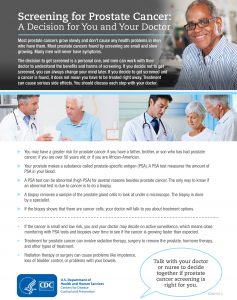 Prostate cancer is the most common non-skin cancer among American men. Prostate cancers usually grow slowly. Most men with prostate cancer are older than 65 years and do not die from the disease. Finding and treating prostate cancer before symptoms occur may not improve your health or help you live longer.
Prostate cancer is the most common non-skin cancer among American men. Prostate cancers usually grow slowly. Most men with prostate cancer are older than 65 years and do not die from the disease. Finding and treating prostate cancer before symptoms occur may not improve your health or help you live longer.
A prostate specific antigen (PSA) test may find prostate cancer at an earlier stage than if you don’t get screened, but most medical groups don’t recommend screening with the PSA test. Learn about prostate cancer and talk to your doctor before you decide to get tested or treated for prostate cancer.
Research has found risk factors that increase your chances of getting prostate cancer. These risk factors include—
- Age: The older a man is, the greater his risk for getting prostate cancer.
- Family history: Certain genes (passed from parent to child) that you inherited from your parents may affect your prostate cancer risk. Currently, no single gene is sure to raise or lower your risk of getting prostate cancer. However, a man with a father, brother, or son who has had prostate cancer is two to three times more likely to develop the disease himself.
- Race: Prostate cancer is more common in African-American men. It tends to start at younger ages and grow faster than in other racial or ethnic groups, but medical experts do not know why.
Researchers are trying to determine the causes of prostate cancer and whether it can be prevented. They do not yet agree on the factors that can influence a man’s risk of developing the disease, either positively or negatively.
Different people have different symptoms for prostate cancer. Some men do not have symptoms at all.
Some symptoms of prostate cancer are—
- Difficulty starting urination.
- Weak or interrupted flow of urine.
- Frequent urination, especially at night.
- Difficulty emptying the bladder completely.
- Pain or burning during urination.
- Blood in the urine or semen.
- Pain in the back, hips, or pelvis that doesn’t go away.
- Painful ejaculation.
If you have any symptoms that worry you, be sure to see your doctor right away. Keep in mind that these symptoms may be caused by conditions other than prostate cancer.
Contact one of our Winston Medical Clinics if you would like to schedule an appointment. To contact Dr. Michael Ard, Dr. Dustin Gentry or Dr. Jana Ebbert call 662-773-3503.
